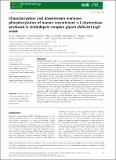Files in this item
Characterization and downstream mannose phosphorylation of human recombinant α-L-iduronidase produced in Arabidopsis complex glycan-deficient (cgl) seeds
Item metadata
| dc.contributor.author | He, Xu | |
| dc.contributor.author | Pierce, Owen | |
| dc.contributor.author | Haselhorst, Thomas | |
| dc.contributor.author | Kolarich, Daniel | |
| dc.contributor.author | Packer, Nicolle H. | |
| dc.contributor.author | Gloster, Tracey | |
| dc.contributor.author | Vocadlo, David J. | |
| dc.contributor.author | Qian, Yi | |
| dc.contributor.author | Brooks, Doug | |
| dc.contributor.author | Kermode, Allison R. | |
| dc.date.accessioned | 2013-08-05T14:01:07Z | |
| dc.date.available | 2013-08-05T14:01:07Z | |
| dc.date.issued | 2013-12 | |
| dc.identifier | 62940362 | |
| dc.identifier | ae658d84-9878-4323-a023-d7c7e25a5ba7 | |
| dc.identifier | 84888136369 | |
| dc.identifier.citation | He , X , Pierce , O , Haselhorst , T , Kolarich , D , Packer , N H , Gloster , T , Vocadlo , D J , Qian , Y , Brooks , D & Kermode , A R 2013 , ' Characterization and downstream mannose phosphorylation of human recombinant α-L-iduronidase produced in Arabidopsis complex glycan-deficient (cgl) seeds ' , Plant Biotechnology Journal , vol. 11 , no. 9 , pp. 1034–1043 . https://doi.org/10.1111/pbi.12096 | en |
| dc.identifier.issn | 1467-7644 | |
| dc.identifier.uri | https://hdl.handle.net/10023/3910 | |
| dc.description | This work was supported by a Wellcome Trust award to TMG. | en |
| dc.description.abstract | Mucopolysaccharidosis (MPS) I is a lysosomal storage disease caused by a deficiency of α-L-iduronidase (IDUA) (EC 3.2.1.76); enzyme replacement therapy is the conventional treatment for this genetic disease. Arabidopsis cgl mutants are characterized by a deficiency of the activity of N-acetylglucosaminyl transferase I (EC 2.4.1.101), the first enzyme in the pathway of hybrid and complex N-glycan biosynthesis. To develop a seed-based platform for the production of recombinant IDUA for potential treatment of MPS I, cgl mutant seeds were generated to express human IDUA at high yields and to avoid maturation of the N-linked glycans on the recombinant human enzyme. Enzyme kinetic data showed that cgl-IDUA has similar enzymatic properties to the commercial recombinant IDUA derived from cultured Chinese hamster ovary (CHO) cells (AldurazymeTM). The N-glycan profile showed that cgl-derived IDUA contained predominantly high-mannose-type N-glycans (94.5%), and the residual complex/hybrid N-glycan-containing enzyme was efficiently removed by an additional affinity chromatography step. Furthermore, purified cgl-IDUA was amenable to sequential in vitro processing by soluble recombinant forms of the two enzymes that mediate the addition of the mannose-6-phosphate (M6P) tag in mammalian cells—UDP-GlcNAc:lysosomal enzyme N−acetylglucosamine (GlcNAc)−1−phosphotransferase—and GlcNAc−1−phosphodiester α−N−acetylglucosaminidase (the ‘uncovering enzyme’). Arabidopsis seeds provide an alternative system for producing recombinant lysosomal enzymes for enzyme replacement therapy; the purified enzymes can be subjected to downstream processing to create the M6P, a recognition marker essential for efficient receptor-mediated uptake into lysosomes of human cells. | |
| dc.format.extent | 323766 | |
| dc.language.iso | eng | |
| dc.relation.ispartof | Plant Biotechnology Journal | en |
| dc.rights | © 2013 The Authors. Plant Biotechnology Journal published by Society for Experimental Biology, Association of Applied Biologists and John Wiley & Sons Ltd This is an open access article under the terms of the Creative Commons Attribution License, which permits use, distribution and reproduction in any medium, provided the original work is properly cited. | en |
| dc.subject | Arabidopsis cgl mutant | en |
| dc.subject | Mucopolysaccharidosis I | en |
| dc.subject | Human α-L-iduronidase | en |
| dc.subject | Mannose-6-phosphate recognition marker | en |
| dc.subject | N-glycosylation | en |
| dc.subject | QK Botany | en |
| dc.subject | QH426 Genetics | en |
| dc.subject | SDG 3 - Good Health and Well-being | en |
| dc.subject.lcc | QK | en |
| dc.subject.lcc | QH426 | en |
| dc.title | Characterization and downstream mannose phosphorylation of human recombinant α-L-iduronidase produced in Arabidopsis complex glycan-deficient (cgl) seeds | en |
| dc.type | Journal article | en |
| dc.contributor.sponsor | The Wellcome Trust | en |
| dc.contributor.institution | University of St Andrews.School of Biology | en |
| dc.contributor.institution | University of St Andrews.Biomedical Sciences Research Complex | en |
| dc.identifier.doi | 10.1111/pbi.12096 | |
| dc.description.status | Peer reviewed | en |
| dc.identifier.grantnumber | 095828/Z/11/Z | en |
This item appears in the following Collection(s)
Items in the St Andrews Research Repository are protected by copyright, with all rights reserved, unless otherwise indicated.

